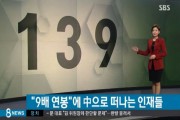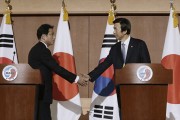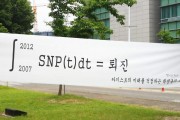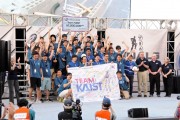A protest by professors at one of Korea’s top universities has reignited debate over the practice of Korean professors conducting their lectures in English. The association of professors at KAIST (Korea Advanced Institute of Science and Technology) accused the school’s 100% English-language lecture policy of forcing “Americanization” and requested a change in the policy. KAIST has been at the center of controversy in recent years related to student suicide and extreme academic competition. The professor’s accusation also tapped into the constant debate within Korea about whether English education is making the country more global or simply more dependent on the United States.
Article from Yonhap:
KAIST Professors: “English-language lectures aren’t promoting globalization, they’re promoting Americanization”
By Ju-young Park
In an August 20th meeting of the Professor’s Association at KAIST professors published a statement stating their formal objections to the university’s requirement that all lectures be conducted in English.
The statement was the first following the appointment of Seong-mo Kang as president of the university six months ago.
Gwang-joon Kim, Director of the Professor’s Association, stated, “In regards to the unforeseen consequences of the English lectures, it would be worthwhile for us to put our heads together and reevaluate…the lecture policy, instituted by former President Nam-pyo Seo in order to increase globalization, has created ‘Americanization’.”
Looking at the roster of 283 associate professors at KAIST, 66.4% received their doctoral degree in America, 26.9% in South Korea, and 1.4% received their degree in the U.K., Canada, or other English-speaking countries. Only 2.5% of associate professors received their degrees in non-English-speaking countries.
Director Kim pointed out that, “While America leads in a number of scientific fields, it lags behind non-English-speaking developed countries when it comes to manufacturing, materials, and components studies…In 2003, 7.8% of full-time professors at KAIST had received their doctoral degree in non-English-speaking developed countries. Following the introduction of the universal English lecture requirement, that proportion sharply decreased to 2.5%.”
He added, “The current policy is not promoting globalization, only Americanization…Something must be done to improve the disproportionate share of American Ph.D.s within KAIST.”
Aerospace Department Professor Seung-oh Park said, “Lectures require smooth communication between professor and student. But when we have to lecture in English on subjects that a majority of students find difficult to understand, they aren’t able to actively participate in the class and it can be difficult to motivate them.”
For example, when it comes to the study of dynamics, courses require knowledge of applied mathematics. However, when a student has a hard time understanding a lecture, it could also be because of difficulty understanding English. On the other hand, if a student has good English skills, they may mistakenly think that will be sufficient to understand the course content.
Acknowledging that the lack of a language barrier made it possible to have a productive visit from star lecturer Michael Sandel, author of “What is Justice?”, Professor Park emphasized, “Good English skills don’t guarantee that you will become an expert.”
He added, “Within KAIST, the fact that 100% of lectures are delivered in English means that foreign students have lower motivation and do not work hard to learn Korean…Since students are our customers, we need to think hard about how to satisfy them.”
Ik-ho Song, Professor of Electrical Engineering, emphasized, “Language and words are inseparable from the identity of a nation…Real globalization means that foreign students will want to come to KAIST to take our excellent courses whether or not they have to learn to speak and read Korean.”
Mechanical engineering professor Se-young Lim also commented, saying, “I think the rational decision is to respect the judgement of the professors who are in the classrooms rather than follow some uniform undergraduate curriculum that relies on English lectures.”
The KAIST Professor’s Association plans to discuss ways to improve the issues related to the English-language lecture policy during a meeting on the 22nd of August with University President Seong-mo Kang.
Comments from Daum:
무소유님:
I fully agree with Professor Song-ik Ho, “Language and words are inseparable from the identity of a nation…Real globalization means that foreign students will want to come to KAIST to take our excellent courses whether or not they have to learn to speak and read Korean.”
행쇼님:
“Language and words are inseparable from the identity of a nation…Real globalization means that foreign students will want to come to KAIST to take our excellent courses whether or not they have to learn to speak and read Korean.” Professor Song-ik Ho spoke the best out of all of them.
코털님:
With engineering, there are already many subjects that are hard to understand even when they are explained in Korean. When the lecture is in English, the professor isn’t able to do his job well and the students listening to the professor can’t understand well either…So except for some professors and students who understand English very well, the engineering classes are going to turn into just another English class.
그년강남스타일님:
That bastard “Myung Bak Lee”’s English immersion education..a ruinous plan to make Korean a second language in Korea.
ARGUS님:
All the professors are speaking truth,,let’s put an end to this crazy education style…how could you express the depth of Korean literature via English..and you have to increase the depth of your thinking about the world…not globalization by parroting others…is this just a country that raises interpreters??
꼬부기우유님:
This is what I found out when I went to America: I found out that America and Europe are different and that Americans are dumber than you might think. I agree with everything that is being said here. If you just learn English, then you’re not getting globalized, you’re getting Americanized. And isn’t the kind of English we learn in Korea American English? American English is different from British English. And when I say that America is different from Europe I’m not saying that Europeans are all the same. Just like how not every Asian is Chinese, Germans are different from French. If you want to exchange with the rest of the world then you have to have an exchange with each country. There is no such thing as a universal language.
atomic님:
I think the English-language lecture policy is a plot by the former university president to lower the standard of students and get back at KAIST. Students are able to learn much better when they are using their mother tongue than when they learn in English. And how many students are there who understand English well enough for it to be their mother tongue? And what good does it do to just hear English in the classroom? What understanding does that bring?
dave0717님:
All spoke the truth.
사람의아들님:
If we had invested the money we are currently spending on private and public education related to our national infatuation with English on science or welfare Korea would be in a much better condition.
요술램프님:
in the physics department at Princeton university there are so many Chinese students that during one class a Chinese professor found that the only students in attendance were Asian, so the professor asked whether they should have the lecture in Chinese. He then went on, all ching chang chong in Chinese, never noticing the Korean student who was sitting amid the Chinese, who couldn’t even raise his voice to say that he couldn’t understand. So Chinese are able to have lectures in Chinese in America but Koreans have to have English lectures in korea?
sonny님:
back when I was an engineering student in the 1980s, I had some lectures in English. But back then, the issue was that none of the textbooks were translated into Korean yet, they were all still in English. These days, with plenty of translated textbooks, it seems like it would be logical to teach students in Korean rather than forcing English on them~
터키쉬앙고라님:
10 years ago I took an aerodynamics course in English at KAIST. The content was hard enough, but because I had to do the class in english I couldn’t understand it. I finished the course but my grade wasn’t good.
al님:
if you refuse Americanization they will call you a commie red and have the intelligence service watch you, be careful.
오만인님:
Ilbe idiots, you think not using English makes someone a commie? Get out of Korea and go live in America.
대나무숲님:
all the suck ups are coming out here, calling people commies..they think the only alternative to relying on America is death.
빨간동전님:
learning things in a foreign language for sure makes it harder to understand..they should first teach the content in Korean and then have a supporting class taught in English..then you could study your major and still pick up another language..







